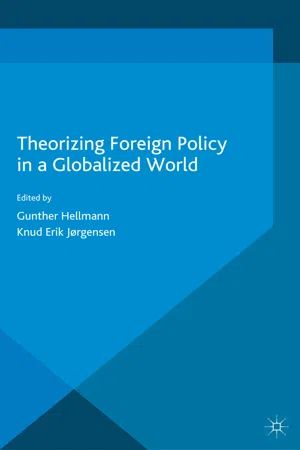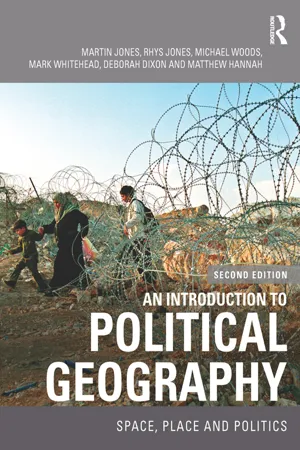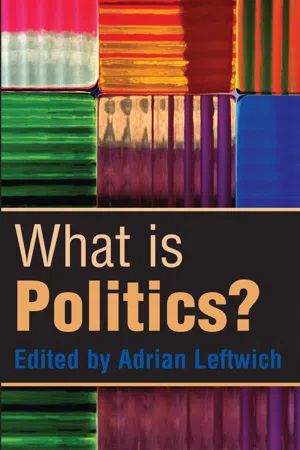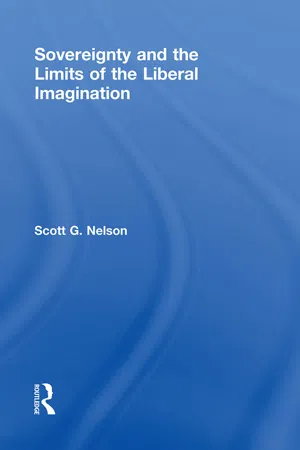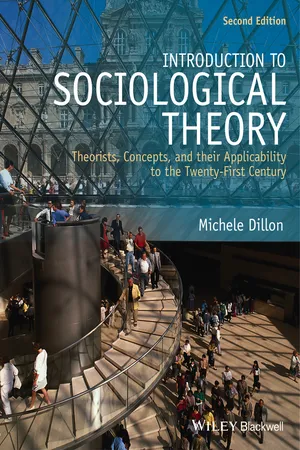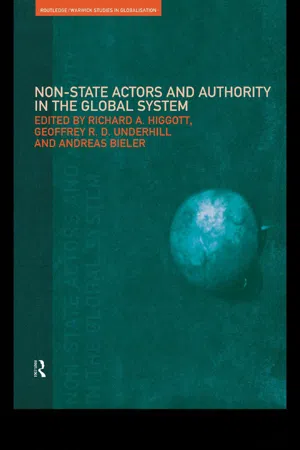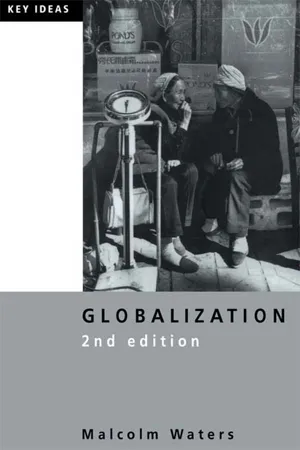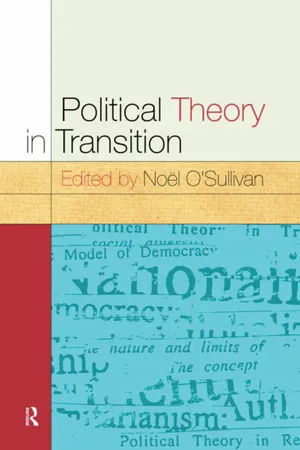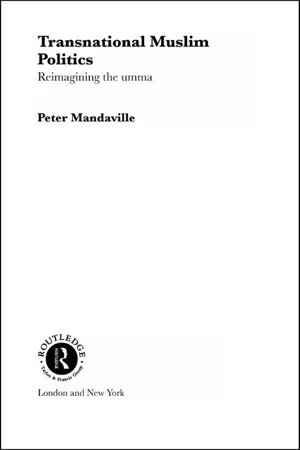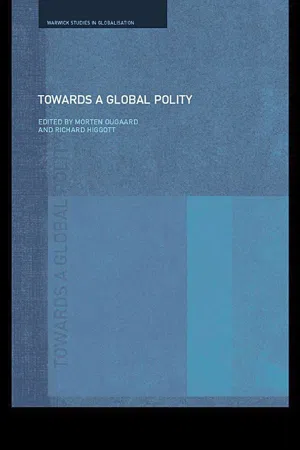Politics & International Relations
Types of Globalisation
Globalization can be categorized into economic, political, and cultural types. Economic globalization refers to the interconnectedness of global markets and trade. Political globalization involves the spread of political ideas and systems across borders. Cultural globalization encompasses the exchange of cultural practices, values, and ideas on a global scale.
Written by Perlego with AI-assistance
Related key terms
Related key terms
1 of 4
Related key terms
1 of 3
11 Key excerpts on "Types of Globalisation"
- eBook - ePub
- Knud Erik Jørgensen, Knud Erik Jørgensen, Kenneth A. Loparo, Knud Erik Jørgensen, Gunther Hellmann(Authors)
- 2015(Publication Date)
- Palgrave Macmillan(Publisher)
2 allowing them to again make sense of the ‘turbulent’ world politics they were observing (Rosenau, 1990; Rosenau and Czempiel, 1992). Since then, global politics and the debate about it have further evolved. Although at times contested (Held and McGrew, 2002, 11–13; Overbeek, 2010), global governance has established itself as an empirical-analytical concept for understanding and studying this evolution (Dingwerth and Pattberg, 2006; Barnett and Sikkink, 2008; Compagnon, 2010).Global governance provides a conceptual answer to the transformation of world politics from a predominantly state-based to an increasingly intricate multi-actor system, which is accentuated by the more recent shift towards multi-polarity and the ongoing proliferation of non-state players at all levels of policy-making. The repercussions these changes have had for foreign policy have however regularly remained under-conceptualized and under-studied. While foreign policy can be considered as an ‘area of enquiry within the discipline of International Relations’ (Alden and Aran, 2012, 1), it has been deplored that foreign policy analysis (FPA) has often not fully engaged with the rest of the discipline of IR (Carlsnaes, 2002, 331; Houghton, 2007, 26). This seems like a paradox if one considers that the premises of IR theories have regularly informed foreign policy concepts and their analysis, with much ‘eclectic borrowing’ notably from (neo-)realism and neoliberalism (but also from other disciplines like social psychology) (Rittberger, 2001; Smith et al., 2008; Alden and Aran, 2012, 112). Yet, systematic work on the ‘general fault-line between the study of foreign policy (looking from the inside out) [ … ] and the study of international relations’ has indeed been scarce (Clark, 1999, 22). The result is that FPA has especially failed ‘to adequately engage with critical intellectual developments in IR over the last two decades’ (Alden and Aran, 2012, 110). One of these intellectual developments is arguably embodied in the concept of global governance. The debate about what global governance may mean for foreign policy and its analysis remains however quite limited.3 - eBook - ePub
An Introduction to Political Geography
Space, Place and Politics
- Martin Jones, Rhys Jones, Michael Woods, Mark Whitehead, Deborah Dixon, Matthew Hannah(Authors)
- 2014(Publication Date)
- Routledge(Publisher)
In this chapter we will examine some of these emerging political geographies of globalisation. First, we will explore the politics of place in the context of globalisation, drawing on writers including Amin and Massey to propose that globalisation is grounded in and contested through particular places. Second, we will discuss and critique the concept of ‘global governance’ as both an aid to and a response to globalisation, as well as the related articulation and performance of ‘global citizenship’. Finally, we investigate alternatives to neoliberal globalisation and the mobilisation of resistance to neoliberal globalisation by social movements that have their own transnational spatialities.BOX 9.1 GLOBALISATIONGlobalisation can be defined, following Steger (2003), as ‘a multidimensional set of social processes that create, multiply, stretch and intensify worldwide social interdependencies and exchanges while at the same time fostering in people a growing awareness of deepening connections between the local and the distant’ (p. 13). This is not the only definition, and other definitions vary in their emphasis, but Steger’s approach is particularly helpful for thinking about the political geographies of globalisation because of the way in which he breaks down globalisation into four key components. First, he proposes, globalisation involves the creation of new networks and relations, and the multiplication of existing networks and relations, that overcome traditional geographical and political boundaries. An international terrorist network such as al-Qaeda is an example of this, but so is a transnational corporation. Second, globalisation involves the expansion and stretching of social relations, activities and interdependencies over increasing distances. Commodity chains, for example, have been stretched to source, process and sell food or manufactured goods around the world, but political institutions have also been stretched over space in moves towards global governance, as discussed later in this chapter. Third, globalisation involves the intensification and acceleration - eBook - ePub
What is Politics?
The Activity and its Study
- Adrian Leftwich(Author)
- 2015(Publication Date)
- Polity(Publisher)
This chapter advocates a conception of politics as global politics. It argues that the traditional distinction between domestic and international politics has become a conceptual fiction which, despite its hold on the wider public imagination, no longer reflects the realities of a highly interconnected world. Politics and governance are becoming globalized as the terrorist attacks of 11 September 2001 and the subsequent events vividly demonstrate. As the world confronts a new century, the classic questions of political life have been re-posed with greater urgency, namely: who rules, in whose interests, by what means, and to what purpose? Addressing these questions intellectually, however, requires moving beyond the mythical ‘Great Divide’ – namely the separation of the study of Politics from the study of International Relations – which has fragmented scholarly political analysis since the birth of the modern state. Analysing global politics is a radical endeavour which involves putting the pieces back together, thereby reconstructing in the process the study of Politics and International Relations.In discussing the distinctive form and dynamics of global politics, this chapter will seek to address four key questions:- What is global politics?
- How is global politics to be understood?
- Where does power lie in global politics?
- Why does the study of global politics matter?
2 Politics Beyond Borders: Towards a Global Politics
Some time ago James Rosenau observed that, ‘Politics everywhere, it would seem, are related to politics everywhere else … now the roots … of political life can be traced to remote corners of the globe’ (cited in Mansbach, Ferguson et al., 1976: 22). As this paragraph took shape, the residents of Lee-on-the-Solent, a small English seaside town in Hampshire, could be heard some streets away, protesting against Home Office proposals to place an asylum centre in the town. Political oppression and economic collapse in distant nations have generated controversy in a normally quiescent residential village. By contrast, the Jubilee 2000 campaign brought together a global coalition of aid, development, religious, human rights and women’s organizations from across the North–South divide to campaign for the abolition of Third World debt. Coordinated campaigns within the national capitals of the G7 states (the USA, the UK, France, Italy, Germany, Japan and Canada) and at the G7 summits in the late 1990s forced the issue on to the global agenda and compelled a subsequent G7 policy response. Both these cases are manifestations of contemporary political globalization: namely, the intensification of worldwide political interconnectedness encompassing transnational policy problems, new systems of global regulation, political action at a distance and transnational solidarities. - Scott G Nelson(Author)
- 2009(Publication Date)
- Routledge(Publisher)
3 Political liberalism and international relations Globalization as necessity: a problematization Globalization is a term in wide circulation in the West that variously refers to a process of making One, of inter-linking disparate and once well walled-off spheres of knowledge, labor, production, and distribution. It is a term used by some to denote dramatic reductions in transaction costs on the flows of capital, commodities, labor, services, and information in the networking global economy, the soon-to-emerge globalopolis. It imagines a world which itself may one daydream of a unique nationalism all its own, a world that will have thoroughly transfigured politics and community and, indeed, reconstituted history, progress, and human freedom. The term, in brief, invokes a series of processes inextricably bound to capitalism, liberalism and (late) modernism. Few deny the centrality of these three “-isms” to globalization’s “processes” – indeed, to its very naming. And few deny the power of market liberalization that seems to be everywhere scripting new conceptions of politics and community, solidarity and collective action, autonomy and agency. But the very conditions of capitalism, liberalism and modernity are only vaguely acknowledged as necessary to the processes of globalization – to its naming, yes, but also to ongoing articulations of political community which are producing new ethico-political relations- eBook - ePub
Introduction to Sociological Theory
Theorists, Concepts, and their Applicability to the Twenty-First Century
- Michele Dillon(Author)
- 2013(Publication Date)
- Wiley-Blackwell(Publisher)
CHAPTER FOURTEENECONOMIC AND POLITICAL GLOBALIZATION
KEY CONCEPTSglobalization disembeddedness glocalization transnational practices capitalist world-system geographical division of labor world-economy core states peripheral areas semi-peripheral areas crisis capitalist globalization socialist globalization global systems theory financial sector financial capitalism global cities class polarization transnational capitalist class denationalized class geopolitical new imperialism dialectical nature of globalization distant proximities post-national denationalized state network society anti-globalization movement global social democracyCHAPTER MENU
What is Globalization? Economic Globalization Immanuel Wallerstein: The Modern World-System Modern World-Economy World-Systems in Contrast to World-Empires Distinctive Characteristics of the Modern World-System The State in the Expansion of Capitalism Changing Context of the Core–Periphery World World-Economy Crisis Contemporary Globalizing Economic Processes - Andreas Bieler, Richard Higgott, Geoffrey Underhill(Authors)
- 2004(Publication Date)
- Routledge(Publisher)
A final understanding of globalisation is to see it simply as but one historical epoch, starting from about the beginning of the détente at the end of the 1960s and the end of the Cold War in 1989 (Higgott and Reich 1998). It is closely associated with the breakdown of the ‘embedded liberal compromise’ (Ruggie 1982) and the rise of neo-liberal economics. It falls clearly within the realist tradition of IR theory. Thus, globalisation implies a shift in the economic and political relationship between the former superpowers at the international level and between capital and labour at the national level. This approach recognises that the structural constraints of globalisation are rooted in agency and that there is, therefore, room for actors to make a difference and change the policy outcomes, in particular in the area of redistribution between the beneficiaries and the losers of globalisation. The state itself is not deemed to be at its end. It is the end of a particular state, the Keynesian welfare state, which has to be dealt with. This understanding is useful in the identification of sites of resistance to global liberalism. Resistance emanates, for example, from old style labour unions in those industries which are negatively affected by global structural change. In addition, other particularistic groups, often related to a specific ethnicity, are key actors in this process of resistance, as they often understand globalisation as a threat to national identity and culture, giving rise to both conservative nationalist and progressive internationalist responses.Depending on the particular understanding of globalisation adopted, the exact distribution of authority between actors differs. Different definitions provide different insights in this highly complex understanding of authority in international relations. This does not automatically need to be expressed in terms of some actors gaining authority at the expense of others. All four perspectives outlined above have one feature in common. They accept states and markets as two distinct entities and take this as their starting-point of investigation. As Burnham (1994) makes clear, this distinction overlooks the fact that states and markets appear only as two different entities in a particular epoch of capitalist development.- eBook - ePub
- Malcolm Waters(Author)
- 2013(Publication Date)
- Routledge(Publisher)
Chapter 3 .TRANS-NATIONAL CONNECTIONS
If globalization is a reality, it presents the discipline of political science with a considerable problem.1 The chief focus of political science analysis is the nation-state, and if globalization genuinely takes effect, the nation-state will be its chief victim. The main vehicle for the political analysis of global trends is the subdiscipline of International Relations (IR).2 IR, with its focus on diplomacy, imperialism and war has always taken a global view of politics. The traditional IR view of these processes takes the form of what we might, after Burton (1973: 28–32), call the ‘snooker-ball model’.3 Here each state is its own little globe and these balls are of various weights and colours. As they change through time – or move across the surface of the table – they interact with each other. Each ball has some ‘autonomy’ exerted upon it by the player (equivalent to the agency of its own government) but as it moves its autonomy is limited by the positions and actions of the other balls (other states). In an extension of this model, the white ball might be a superpower.IR has gone through many changes as it has adapted to transformations in the shape of international politics. However, the most recent shift, the one that coincides with the recent acceleration of globalization, is the most significant. It is beginning to encompass relations between economies and cultures that bypass primarily political agencies. In so doing it is reconstructing itself as a proto-theory of globalization. It must be described only as a proto-theory because all of its instances are dualistic. They retain a commitment to the continuing saliency of relations between states but accept that economic and cultural integrations develop alongside them. - eBook - ePub
- Noel O'Sullivan(Author)
- 2013(Publication Date)
- Routledge(Publisher)
10 The borders of (international) political theory Chris Brown DOI: 10.4324/9780203502143-14 Introduction One of the ways in which political theory can be said to be currently 'in transition' is in terms of its understanding of the 'international'. 1 There are a number of interrelated stories that can be told here, some of which turn upon changes in the assumed natures of political theory and international relations theory as discourses, while others relate to real-world changes, such as the phenomenon of 'globalization', but all of which tell of borders and borderlines. The idea that there is a clear distinction between 'politics' and 'international relations' as subjects of theory is partly a reflection of a world composed of clearly delineated, bounded political entities - sovereign states - where the form that political activity takes within the boundaries of these entities is dramatically different from the form of political activity between them. On this basis we might expect that as the physical borders between these entities change in significance, become more permeable, so the borders between political theory and international relations theory will slowly come down. But the distinction between politics and international relations is only in part to be seen as a reflection of this world of states; this distinction is, in itself, constitutive of that which it tries to distinguish - a point re-emphasized recently by 'constructivist' theorists of international relations such as Friedrich Kratochwil (1989), J. G. Ruggie (1998), and Alexander Wendt (1999). It is partly because certain kinds of theory draw distinctions between insiders and outsiders in the way they do, that the borders we find in the real world have the significance they have - eBook - ePub
Transnational Muslim Politics
Reimagining the Umma
- Peter G. Mandaville(Author)
- 2003(Publication Date)
- Routledge(Publisher)
It implies, for instance, that we have a set of criteria which tells us what counts as ‘political’ or ‘societal’ - and international theory, I have argued above, tends to work within predetermined limits of what can legitimately be called politics. Therefore I am not simply putting forward a case for concentrating on ‘low’ rather than ‘high’ politics, for to adopt such a scheme would do nothing but reinforce that dichotomy; my aim, rather, is to question the nature of politics and not simply to relocate it in a pre-existing, overdeterminate scheme. In this sense, then, I am interested in finding new idioms of what politics can be - or, indeed, must be - under conditions of rapid and profound social transformation. In this section I have argued that conventional international relations theory fails to take account of many forms of politics, community and identity thrown up by the tensions of a turgid late modernity. Intense social transformations - the key features of which I identify above - cause us to problematise our received notions of the political and to recognise new spaces and sites in which politics takes place. Furthermore, the state-centric nature of traditional IR theory has blinded it to any political form which does not conform to the requirements of political science qua state science. Even those theorists who do take account of ‘alternative’ actors in international relations still tend to use the state as a benchmark by which to evaluate the efficacy of these politics. As Yosef Lapid puts it: [A]s an ‘inter-’ type discipline long dominated by political realism, the IR field should have been doubly well prepared to deal with issues of diversity. Instead, recent events have rendered apparent IR’s inability to encompass vastly accelerated and co-occurring dynamics of integration and disintegration at both sub- and supra-state levels - eBook - ePub
Towards a Global Polity
Future Trends and Prospects
- Richard Higgott, Morten Ougaard(Authors)
- 2002(Publication Date)
- Routledge(Publisher)
political analysis in general.Examples abound. Susan Strange, for instance, chose to make Easton’s (1953) definition of politics a central tenet of her analysis of the diffusion of power in the world economy (Strange 1996). Clive Archer (1992) discussed the functions of international organizations in terms derived from Almond and Powell’s (1966) contribution to comparative politics; Martin Shaw (2000) posed the question of the theory of the global state; Braithwaite and Drahos (2000) directly addressed global business regulation; while other scholars have focused on global policy analysis (Soroos 1991), global public policies (Reinicke 1998), global public goods (Kaul et al. 1999), global social policy (Deacon et al. 1997), or have applied Marxian or Gramscian concepts of class, power and hegemony (e.g. Van der Pijl 1984, 1998; Cox 1987; Murphy 1994; Gill 1995; Sklair 2001), or the Habermasian concept of communicative action (Risse 2000a) to international politics and international political economy.This presents a seemingly straightforward solution to the question of how to transcend state-centred perspectives. It contrasts with attempts to theorize the new pattern of world politics through the invention of entirely new concepts, neologisms, and creative metaphors, a strategy that at times seems to have been quite faddish. Of course, new concepts should be added when truly justified, but obviously many researchers have found it more productive to turn to long-established concepts and theoretical perspectives from comparative politics, general political analysis and political economy, and apply them to the global context. This in turn also contrasts with attempts by state-centred theorists to face the theoretical challenge by restating and adding on to the state-based model of the international political system. Indeed, what it implies is in a sense a reversal of strategy - eBook - ePub
- Stefan A. Schirm(Author)
- 2006(Publication Date)
- Routledge(Publisher)
6 Political transnationalizationThe future of the nation-state – a comparison of transnational policy regimes
Edgar Grande, Markus König, Patrick Pfister and Paul Sterzel1 Globalization and political transnationalization: limitations of “global governance” research1
The following chapter focuses on the consequences of globalization for the development of statehood and the preconditions for governance. Despite differences concerning the details, the findings of political science research on the implications of (particularly economic) globalization on national politics (Weiss 1998, 2003; Held et al. 1999; Bernauer 2000; Scharpf 2000; Scharpf and Schmidt 2000; Lütz 2002; Busch 2003; Prange-Gstöhl 2004; Ganghof 2005; Wagschal 2005; Zohlnhöfer 2005) have clearly shown that the initially dominant hypotheses on the “retreat of the nation-state” and the “end of politics” (Guéhenno 1994; Ohmae 1990, 1995; Strange 1996) are empirically invalid. There is neither convincing evidence for a financial or regulatory “race to the bottom” in which wealthy multi-national corporations eventually prevail, nor are there any indications of extensive societal self-regulation beyond the nationstate, that is of “governance without government” (Rosenau and Czempiel 1992), completely replacing state interventions. Yet, the opposite thesis, according to which states single-handedly, or through intergovernmental cooperation, are capable of defending their capacity to act, of keeping societal lobbies at bay, and thus eventually maintaining or even strengthening their own position, cannot be convincingly substantiated either (see McGrew 2002; Schimmelfenning 2004).There are, however, numerous indications that globalization is contributing to a fundamental transformation of national governance, albeit in a complex manner. The establishment of abundant and manifold new structures and forms of governance beyond the nation-state is particularly significant in this context. The results of these developments, thus far observable, are complex institutional architectures of transnational order formation and rule implementation with pervasive implications for the preconditions of formulating and asserting national interests (Held 2004; Slaughter 2004). In this process, traditional structures and actors of political decision-making and policy implementation are being regrouped, recombined with other institutions and actors, and amalgamated into a new architecture of political authority. During the past years, numerous concepts have been developed in order to analyse and define these new forms of governance. These are, among others, the concepts of the “network polity” (Ansell 2000), the “networked state” (Castells 1996), the “transnational state” (Beck 1997, 2002), “complex multilateralism” (O’Brien et al. 2000), “global civil society” (Lipschutz 2000), “global public policy” (Reinicke 1998), “global public policy networks” (Reinicke and Deng 2000), “global corporatism” (Kaul et al
Index pages curate the most relevant extracts from our library of academic textbooks. They’ve been created using an in-house natural language model (NLM), each adding context and meaning to key research topics.
Explore more topic indexes
Explore more topic indexes
1 of 6
Explore more topic indexes
1 of 4
